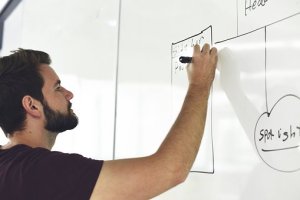Think like an entrepreneur to cultivate creativity and innovation in your role.
As a learning and development (L&D) professional, you may not think of yourself as an entrepreneur, but embracing an entrepreneurial mindset can help you foster creativity and innovation in your organization. Understanding how you can encourage an antifragile approach to deal with internal forces as challenges arise within your company is essential. Connect that to how you show up in your job and how it affects both your own effectiveness as well as co-workers’ effectiveness.
What it is
The pursuit of entrepreneurship in the context of an existing organization is often called corporate entrepreneurship or intrapreneurship – whether it is a for-profit corporation, a not-for-profit organization, a government agency, or any other type of company.
Corporate entrepreneurship is a method used to develop new businesses, products, services, or processes inside of an existing organization to create value and generate new revenue growth through entrepreneurial thought and action. People who see themselves as corporate entrepreneurs are the engines of growth within a company; they are often corporate leaders or develop into leadership roles.
L&D professionals are well positioned to harness their intrinsic entrepreneurial skills to create value in their organizations given their roles entail working with both internal customers and a variety of other stakeholders. Further, the skills, knowledge, and ability L&D practitioners possess can help them solve corporate problems by thinking like an entrepreneur.
How it works
Here’s an example: The operations team at a small technology company in the data analytics space had a major problem – the startup competed against industry giants such as IBM. As the old saying goes, “Nobody ever got fired for buying IBM.” The team leader needed to figure out how the company could compete and get the attention of prospects to have them take the leap of faith to buy from a smaller, unproven vendor.
Operations team members assessed the skills, knowledge, and abilities in terms of how they could take an entrepreneurial approach to solve that problem. The team identified the company’s customers and their compelling needs. Because people were tired of waiting on hold and dealing with multiple customer service representatives who couldn’t solve their problems, the startup began taking a customer-centric approach. The team figured out that one way it could differentiate was by gearing all its operational decisions toward how to best serve the customer and provide an excellent customer experience.
The operations team simplified the process for the customer – from being able to always talk to a knowledgeable person to easy, one-page contracts – which helped the business succeed. As the company grew from a startup to a more established business, customers still valued and encouraged the founders’ entrepreneurial spirit and mindset. The happy ending to this story is that IBM acquired the company after seeing the value it provided to customers.
Guidelines
As corporate entrepreneurs start activating their ideas, they should aim small so that if they succeed, they can build on that success; if they miss, they may learn even more from that experience, which will help in the future.
Corporate entrepreneurs should also look to cultivate an antifragile mindset, a concept taken from Nassim Nicholas Taleb’s book Antifragile. His premise is that many things in life benefit from stress, disorder, volatility, and turmoil — they not only gain from chaos but need it to survive and flourish. To be antifragile, individuals must bend but be strong enough not to break.
In a talk by GE Ventures CEO Sue Siegel to entrepreneurs at the Massachusetts Institute of Technology, she said, “The pace of change today is the slowest it will ever be.” People with an entrepreneurial and antifragile mindset can prepare themselves and their organizations for rapid change and disruption. They get stronger in the face of adversity.
Results
The outcomes of corporate entrepreneurship will be evident once individuals start thinking like an entrepreneur and moving forward with this mindset, which opens up a world of possibilities – such as IBM acquiring your startup business. Set a vision and create a team of people with credibility and a good understanding of the problem you are trying to solve.
One of the biggest obstacles is overcoming initial inertia. The do-nothing strategy tends to be easier for corporate employees than embracing change. To combat this, align yourself with employees who have a compelling reason to change, and educate them on how the new product or service or way of doing things will address their problem.
As Netflix co-founder Marc Randolph, states, “If you are unwilling to disrupt your business, there will always be someone willing to do it for you.” Demonstrate that you are able to stand in the storm and provide leadership as a change agent for your organization.
Checklist
- What is the problem you are trying to solve? What benefits will it deliver to your customers?
- Define the problem, quantify it. Can you do primary market research with open-ended questions to validate your hypothesis?
- Come up with solutions. Does your solution solve a compelling need? Does it make monetary sense?
- De-risk your solutions. How can these solutions be adopted by your prospects with a low risk to them?
- Identify a team to help. Success is more likely when you are backed by a team. Entrepreneurship is not a solo sport!
Resources
Disciplined Entrepreneurship,Bill Aulet
Antifragile, Nassim Nicholas Taleb
An Introduction to Start-up Accelerators Around the World, Trish Cotter
Personal Branding and Marketing Yourself, Rita Balian Allen
About the authors
Patricia “Trish” Cotter is an entrepreneurship consultant and coach as well as a past director of MIT’s delta v student venture accelerator program; patriciacotter76@gmail.com.
Rita Balian Allen is an executive coach focused on leadership development, management training and career development; rita@ritaballenassociates.com.
Note: This article is the property of ATD. It was published August 1, 2023 in TD Magazine:
https://www.td.org/magazines/td-magazine/when-entrepreneurship-and-antifragility-collide





























 Capturing the promise of artificial intelligence (AI) will require that companies understand that their current software support infrastructure is inadequate. Right now – to the extent that AI exists in organizations – it exists in small models in distinct units. These models are being created using unique data sets, targeted toward particular outcomes. However, taking AI to scale and putting it in operationally critical places will require a more robust approach organizationally and therein lies the management challenge.
Capturing the promise of artificial intelligence (AI) will require that companies understand that their current software support infrastructure is inadequate. Right now – to the extent that AI exists in organizations – it exists in small models in distinct units. These models are being created using unique data sets, targeted toward particular outcomes. However, taking AI to scale and putting it in operationally critical places will require a more robust approach organizationally and therein lies the management challenge.